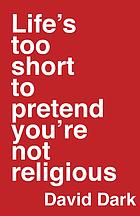
Life's Too Short to Pretend You're Not Religious
- اطلاعات
- نقد و بررسی
- دیدگاه کاربران
نقد و بررسی

December 14, 2015
Belmont University theology professor Dark (The Sacredness of Questioning Everything) fears the mention of religion is now a taboo that shuts down conversation, and he wants to “crack it open again.” With candor and humor, he synthesizes a broad range of cultural voices alongside his own “attention collection” of personal influences to create an argument against the thought that we can escape religion. He begins by positing that many wish to distance themselves from being “religious” and all the associated connotations with violence, brainwashing, self-righteousness, and hypocrisy, preferring instead to be thought of as “spiritual.” But Dark asserts that religion actually encompasses all the controlling stories that make up a person’s belief system. Through references to science fiction novels, Wendell Berry, Thomas Merton, and Daniel Berrigan, Dark sheds light on how thoughts are handed down to us, what we judge to be essential, and the ways in which we can begin to unlearn all that we have unwittingly inherited. Dark’s argument couched in a memoir is a persuasive, well-grounded case for religion’s place in modern society.

May 1, 2016
People who are religious are often characterized as adhering to certain esoteric beliefs or practices. Some consider faith as being superstitious, wedded to hypocritical and parasitical institutions. Even those who appear religious might prefer to be called "spiritual." Dark (religion, Belmont Univ.; The Sacredness of Questioning Everything) will have none of this. Drawing from his sentiments as a writer, he identifies sacred traits in people from Kurt Vonnegut to Thomas Merton. Avoiding generalities, the author illuminates religion as connections among people and the wonder found within the world. He argues that there is an embodied mysticism in which the transcendent emerges from our everyday lives and maintains that to some degree all are religious and that religion itself isn't bad, the distinction being between true religion and destructive ideologies. While not a novel or sectarian position, it is refreshing that this approach comes from an avowed Christian. VERDICT Anyone who wishes to get beyond the acrimony between believers and secularists will appreciate Dark's narrative, even if they wonder whether religion differentiates good from bad.--JW
Copyright 2016 Library Journal, LLC Used with permission.




دیدگاه کاربران